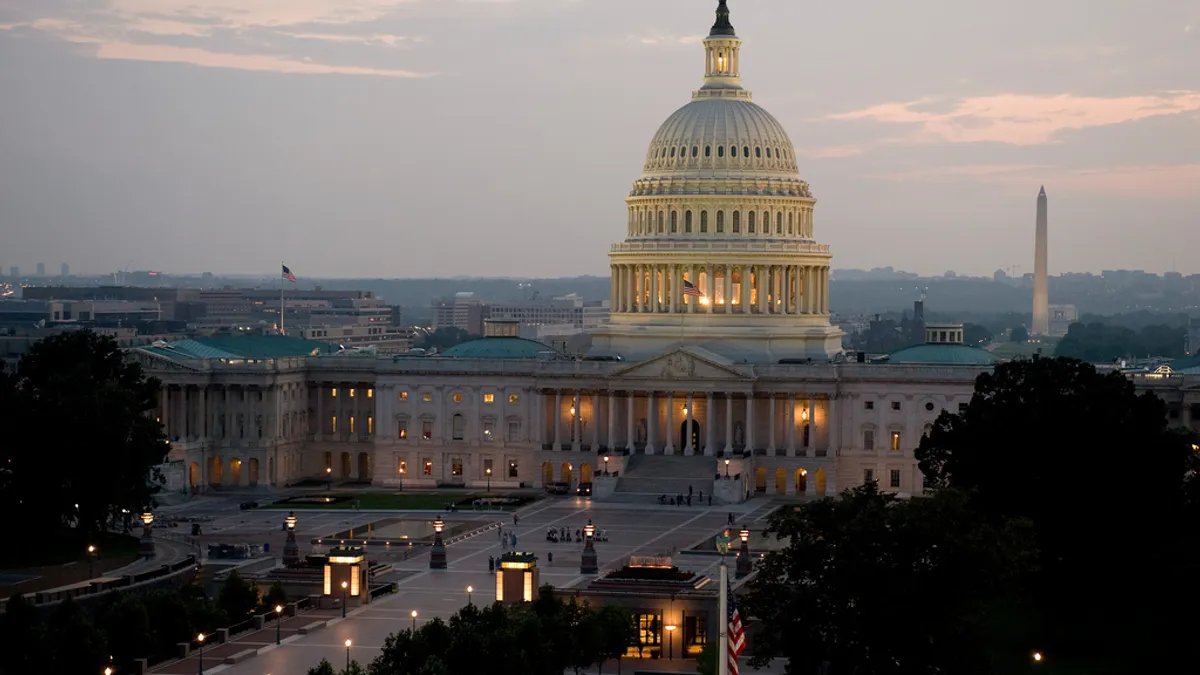Dive Brief:
-
A Democrat-controlled Congress paired with President-elect Joe Biden creates a favorable environment for continued utility investment in clean energy resources, analysts say.
-
Democrats will have a slim majority in the House and even slimmer in the Senate, but their control increases the potential for clean energy and climate legislation, according to stakeholders. The administration's priorities on green infrastructure will lead to greater opportunities for clean energy investments, analysts say. In response, renewables and energy storage companies' stocks — including Sunrun, Tesla, Bloom Energy, Eos Energy and First Solar — soared Wednesday and Thursday.
-
But other parts of the power sector may not fare as well under the new setup in Washington. There is some risk to investments in gas infrastructure, for example, note other analysts. Meanwhile, analysts are also keeping an eye on how potentially higher corporate taxes, which could come in the new Congress, may impact customer bills and utility spending.
Dive Insight:
Regulated utilities have increased capital spending consistently year-over-year for the past decade, according to the Edison Electric Institute (EEI), averaging over $100 billion in such expenditures annually. As a result, "industry has been at the forefront of" trends toward increased renewable energy and storage deployment, said Richard McMahon, senior vice president of energy supply and finance at EEI.
But although utilities continued to ramp up investment in renewable energy under President Donald Trump, who ran his 2016 campaign in part on a promise to bring back the coal industry, analysts still say U.S. utilities are poised to benefit more from the stated policies of the Biden administration, as well as a Congress expected to be more bullish on including clean energy provisions in a future stimulus package.
"Fundamentally, U.S. utilities seem uniquely positioned to benefit from Biden's green infrastructure plan, which would support higher infrastructure spending, renewables in particular," wrote Andrew Weisel, an analyst at Scotiabank, in an outlook report released Thursday.
"Many priorities under the new administration will establish a favorable environment for utility clean energy investment," agreed Greg Litra, partner and director of research at ScottMadden. "This may include energy efficiency, renewable generation (i.e., solar, wind), distributed energy resources, and transmission," he said in an email.
This was partially evident in the stock markets' positive response to clean energy companies Wednesday, said Anthony Crowdell, executive director at Mizuho Americas.
"Any utilities with a green angle, or a green tint, or plan to become more green will now have support at the federal level," he said. "Those stocks yesterday, probably outperformed ones that do not have a ... green agenda."
There is also potentially risk to utility investments incompatible with zero-emissions targets — for example, gas infrastructure or other fossil-fueled generation.
"Some new net zero-oriented investments may not only be an opportunity for utilities but may also result in under-utilized investments," said Litra.
What is less clear is how the power sector might respond to higher taxes. Weisel said higher corporate taxes would likely have "only a modest impact" on earnings per share, while broadly improving cash flows and credit metrics across the board, because tax credits, depreciation and other factors increase cash collections over taxes paid, thus supporting credit metrics for some utilities. But Crowdell noted that lower corporate tax rates under Trump overall lowered customer bills and increased utility expenditures.
"Lower tax rates were a mixed bag for regulated utilities," he said. "They were neutral to earnings. But they did lower customer bills, which enabled utilities to maybe keep spending at high levels of" capital expenditure.















